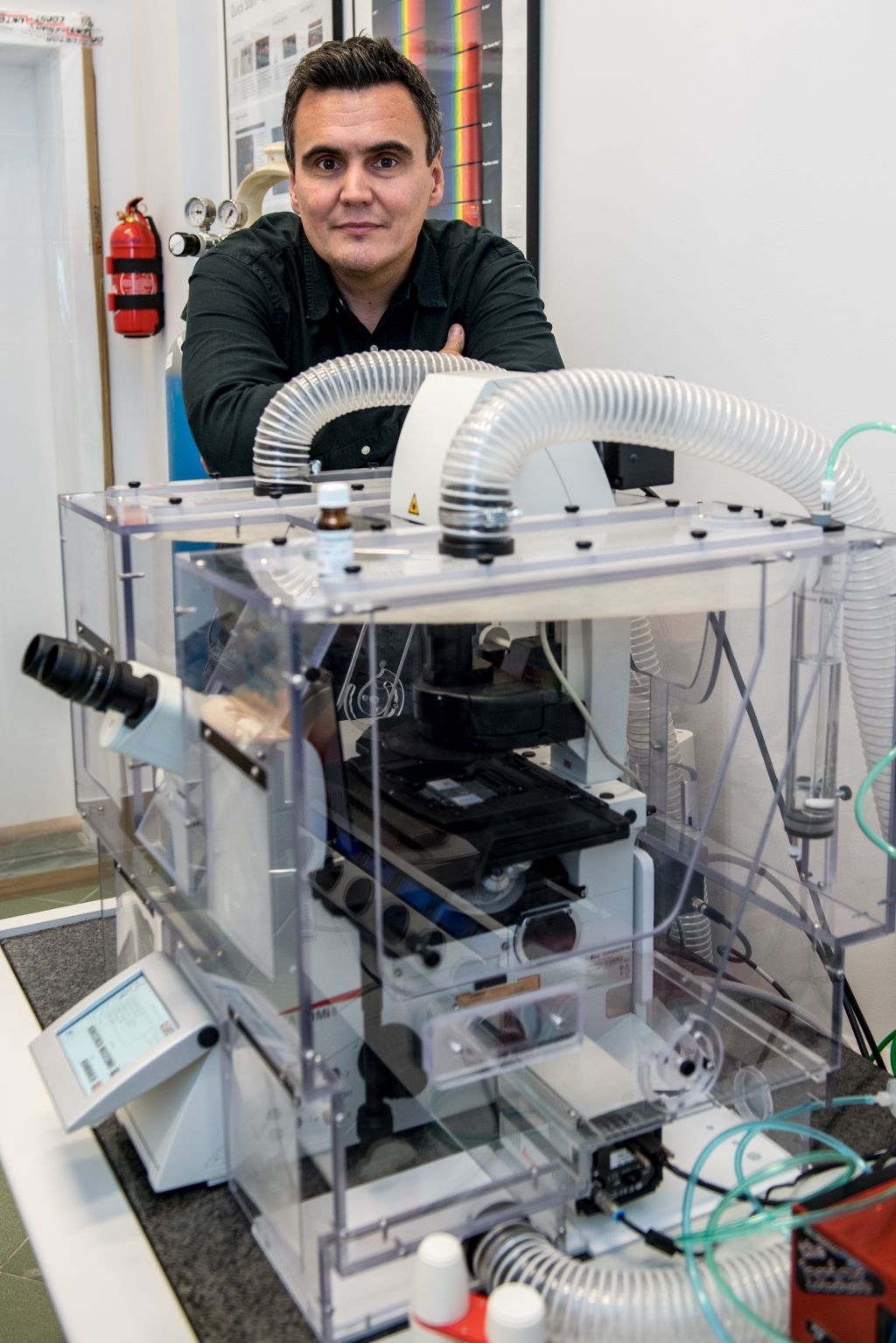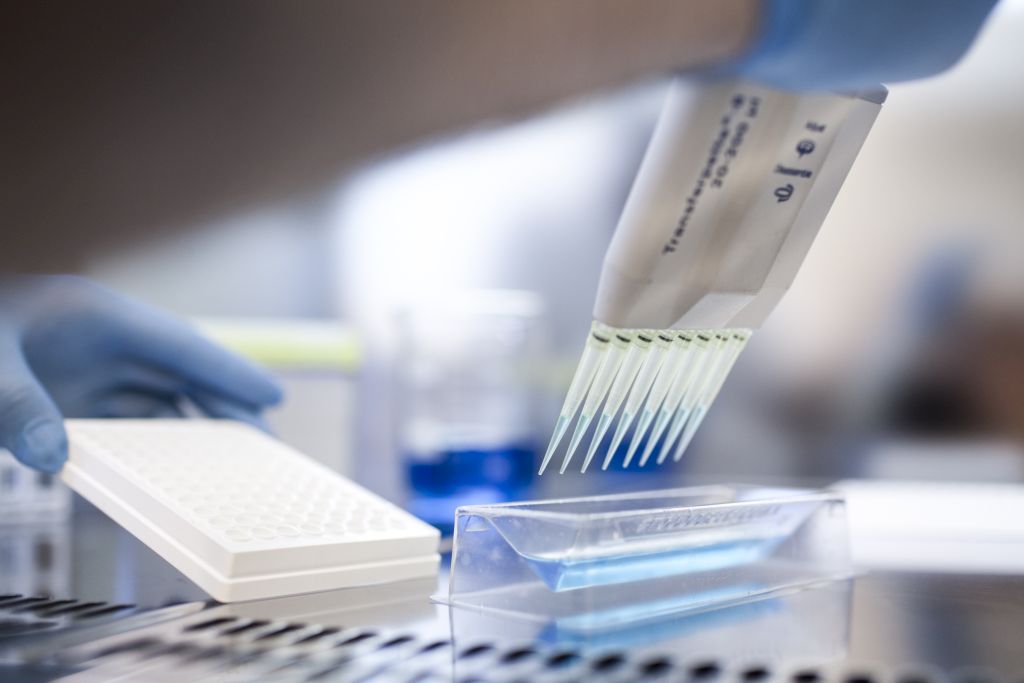YOUR BROWSER IS OUT-OF-DATE.
We have detected that you are using an outdated browser. Our service may not work properly for you. We recommend upgrading or switching to another browser.
Date: 23.10.2020 Category: general news, international cooperation, science/research/innovation
Professor Marcin Drąg, together with scientists from Poland, Germany, and Belgium, has managed to identify chemical compounds that inactivate the SARS-CoV-2 virus in infected human cells. The research results were published in "Nature Chemical Biology".
 The race against the clock for an effective medicine against the coronavirus is still ongoing. One of the world's leading teams dealing with this issue is the team headed by Professor Marcin Drąg from the Department of Biological Chemistry and Bioimaging of Wrocław University of Science and Technology. The Wrocław-based researchers have identified and successfully tested molecules that very strongly inhibit the replication of SARS-CoV-2. – This is the beginning. I hope that it can soon be clinically tested – says Professor Marcin Drąg.
The race against the clock for an effective medicine against the coronavirus is still ongoing. One of the world's leading teams dealing with this issue is the team headed by Professor Marcin Drąg from the Department of Biological Chemistry and Bioimaging of Wrocław University of Science and Technology. The Wrocław-based researchers have identified and successfully tested molecules that very strongly inhibit the replication of SARS-CoV-2. – This is the beginning. I hope that it can soon be clinically tested – says Professor Marcin Drąg.
The compound identified is an inhibitor, i.e. a substance capable of stopping the Mpro protease, an enzyme formed in a human cell as a result of the coronavirus. When the virus enters a human cell, it makes it produce a complex of viral proteins. Two proteases are released from this protein complex, which further "cut" it into pieces. In this way, further proteins come into being, allowing the virus to multiply.
The first of these proteases, PLpro, was described by the scientists in their previous paper, published recently in “Science Advances”. Now it’s time for Mpro. However, in this case, our scientist's team has achieved more.
– Not only have we demonstrated that Mpros from both SARSs are identical at the binding place of potential drugs, but we have also created an inhibitor which completely blocks Mpro and then tested it on SARS-CoV-2 infected cells – says Professor Marcin Drąg.
These tests were carried out in Leuven, Belgium, in Professor Johan Neyts' laboratory at the university there.
– It’s one of the world’s best virological laboratories. There, our compound was tested on specially prepared human liver cells, infected with SARS-CoV-2 – explains Professor Marcin Drąg. – It turns out that it works just as well as the remdesivir, which is currently used for treatment. Is it better because it directly targets the protease of this particular coronavirus? It must be tested in clinical trials because, although the mechanisms of its action are different, its similar inhibitory effect is very similar – it’s practically the same power – he adds.
 To make sure that the relationship is related to the Mpro protease, in the laboratory of Professor Rolf Hilgenfeld from the University of Lübeck, the scientists decrypted the crystalline structure of the Mpro enzyme itself with the inhibitor. One of the following steps in the research process was to examine how the compound would behave in biological material taken directly from COVID-19 patients.
To make sure that the relationship is related to the Mpro protease, in the laboratory of Professor Rolf Hilgenfeld from the University of Lübeck, the scientists decrypted the crystalline structure of the Mpro enzyme itself with the inhibitor. One of the following steps in the research process was to examine how the compound would behave in biological material taken directly from COVID-19 patients.
These studies were carried out in Łódź by the group led by Professor Wojciech Młynarski of the local Medical University. The cell samples were taken from COVID-19 patients’ throats. Those with positive results were tested using a special compound, the so-called chemical probe, obtained in the laboratory of Professor Marcin Drąg. It contained an inhibitor combined with a fluorescent marker, enabling the detection of such a chemical compound’s behaviour in a living system. As a result, using a special microscope, it was possible to check how the Mpro protease reacts with the inhibitor.
Also, apart from the work that has just been published in the prestigious journal “Nature Chemical Biology", Professor Marcin Drąg's laboratory immediately used the knowledge about both proteases to retarget medicines, identifying a group of compounds blocking the action of both enzymes used by the coronavirus to multiply inside human cells.
– We found out that the numerous analogues of the well-known medicine ebselene work very well on both enzymes. These studies were carried out in cooperation with Miroslaw Giurg, PhD, Eng. from Wrocław University of Science and Technology, who obtains such compounds in his laboratory. We’re currently testing them in virological laboratories. In the light of the preliminary information, it turns out that many of them work very well – says Professor Marcin Drąg.
The research is also already available as a pre-print of a publication available on this website.
Most importantly, the results of his research into substances capable of overcoming the coronavirus have been made available to other scientists by Professor Marcin Drag’s group for free. – Everybody can use this knowledge. If someone succeeds, with our help, in developing a working drug, I’ll be happy – concludes the scientist.
Our site uses cookies. By continuing to browse the site you agree to our use of cookies in accordance with current browser settings. You can change at any time.